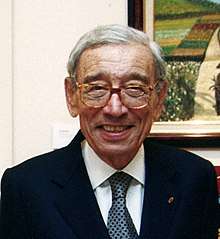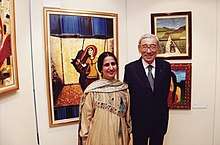Boutros Boutros-Ghali
Boutros Boutros-Ghali (/ˈbuːtrɒs ˈɡɑːli/; Coptic: Ⲡⲉⲧⲣⲟⲥ Ⲡⲉⲧⲣⲟⲥ-Ⲅⲁⲗⲓ, Arabic: بطرس بطرس غالي Buṭrus Buṭrus Ghālī, Egyptian Arabic: [ˈbotɾos ˈɣæːli]; 14 November 1922 – 16 February 2016) was an Egyptian politician and diplomat who was the sixth Secretary-General of the United Nations (UN) from January 1992 to December 1996. An academic and former Vice Foreign Minister of Egypt, Boutros-Ghali oversaw the UN over a period coinciding with several world crises, including the breakup of Yugoslavia and the Rwandan genocide. He went on to serve as the first Secretary-General of the Organisation internationale de la Francophonie from 16 November 1997 to 31 December 2002.
Boutros Boutros-Ghali | |
|---|---|
Ⲡⲉⲧⲣⲟⲥ Ⲡⲉⲧⲣⲟⲥ-Ⲅⲁⲗⲓ بطرس بطرس غالي | |
 Boutros-Ghali in 2002 | |
| 6th Secretary-General of the United Nations | |
| In office 1 January 1992 – 31 December 1996 | |
| Preceded by | Javier Pérez de Cuéllar |
| Succeeded by | Kofi Annan |
| 1st Secretary-General of La Francophonie | |
| In office 16 November 1997 – 31 December 2002 | |
| Preceded by | Position established |
| Succeeded by | Abdou Diouf |
| Minister of Foreign Affairs Acting | |
| In office 17 September 1978 – 17 February 1979 | |
| Prime Minister | Mamdouh Salem Mustafa Khalil |
| Preceded by | Muhammad Ibrahim Kamel |
| Succeeded by | Mustafa Khalil |
| In office 17 November 1977 – 15 December 1977 | |
| Prime Minister | Mamdouh Salem |
| Preceded by | Ismail Fahmi |
| Succeeded by | Muhammad Ibrahim Kamel |
| Personal details | |
| Born | 14 November 1922 Cairo, Egypt |
| Died | 16 February 2016 (aged 93) Cairo, Egypt |
| Political party | Arab Socialist (Before 1978) National Democratic (1978–2011) Independent (2011–2016) |
| Spouse(s) | Leia Maria Boutros-Ghali |
| Alma mater | Cairo University University of Paris Institute of Political Studies, Paris |
| Signature | |
Early life and education
Boutros Boutros-Ghali was born in Cairo, Egypt, on 14 November 1922 into a Coptic Christian family.[1] His father Yusuf Butros Ghali was the son of Boutros Ghali Bey then Pasha (also his namesake), who was Prime Minister of Egypt from 1908 until he was assassinated in 1910.[2][3] His mother Safela Mikhail Sharubim was daughter of Mikhail Sharubim (1861–1920), a prominent public servant and historian.[4]
Boutros-Ghali graduated from Cairo University in 1946.[5] He received a PhD in international law from the University of Paris and diploma in international relations from the Sciences Po in 1949. During 1949–1979, he was appointed Professor of International Law and International Relations at Cairo University. He became President of the Centre of Political and Strategic Studies in 1975 and President of the African Society of Political Studies in 1980. He was a Fulbright Research Scholar at Columbia University from 1954 to 1955, Director of the Centre of Research at The Hague Academy of International Law from 1963 to 1964, and Visiting Professor at the Faculty of Law at Paris University from 1967 to 1968. In 1986 he received an honorary doctorate from the Faculty of Law at Uppsala University, Sweden.[6] He was also the Honorary Rector of the Graduate Institute of Peace Studies, a branch of Kyunghee University Seoul.
Political career

Boutros Boutros-Ghali's political career developed during the presidency of Anwar El Sadat. He was a member of the Central Committee of the Arab Socialist Union from 1974 to 1977. He served as Egypt's Minister of State for Foreign Affairs from 1977 until early 1991. He then became Deputy Minister for Foreign Affairs for several months before moving to the UN. As Minister of State for Foreign Affairs, he played a part in the peace agreements between President Sadat and Israeli Prime Minister Menachem Begin.[7]

According to investigative journalist Linda Melvern, Boutros-Ghali approved a secret $26 million arms sale to the government of Rwanda in 1990 when he was Foreign Minister, the weapons stockpiled by the Hutu regime as part of the fairly public, long-term preparations for the subsequent genocide. He was serving as UN Secretary-General when the killings occurred four years later.[8]
Secretary-General of the United Nations (1992–1996)
1991 selection
Boutros-Ghali ran for Secretary-General of the United Nations in the 1991 selection. The top post in the UN was opening up as Javier Pérez de Cuéllar of Peru reached the end of his second term, and Africa was next in the rotation. Boutros-Ghali tied Bernard Chidzero of Zimbabwe in the first two rounds of polling, edged ahead by one vote in round 3, and fell behind by one vote in round 4. After several countries withdrew their support for Chidzero, fed by fears that the United States was trying to eliminate both of the leading candidates, Boutros-Ghali won a clear victory in round 5.[9]
First term

Boutros-Ghali's term in office remains controversial. In 1992, he submitted An Agenda for Peace, a suggestion for how the UN could respond to violent conflict. He set three goals: for the UN to be more active in promoting democracy, for the UN to conduct preventative diplomacy to avert crises, and to expand the UN's role as peacekeeper. Although the goals were consistent with those of American President George H. W. Bush, he nevertheless clashed repeatedly with the United States, especially with his efforts to involve the UN more deeply in the civil wars in Somalia 1992 and in Rwanda in 1994. The United States refused to send troops under UN leadership.[10] Boutros-Ghali was criticised for the UN's failure to act during the 1994 Rwandan genocide, which officially left over one million people dead, and he appeared unable to muster support in the UN for intervention in the continuing Angolan Civil War. One of the hardest tasks during his term was dealing with the crisis of the Yugoslav Wars after the disintegration of the former Yugoslavia. The UN peacekeeping force was ineffective in Bosnia, forcing the intervention by NATO in December 1995. His reputation became entangled in the larger controversies over the effectiveness of the UN and the role of the United States in the UN.
Some Somalis believed he was responsible for an escalation of the Somalia crisis by undertaking a personal vendetta against Mohamed Farrah Aidid and his Habr Gidr clan, favouring their rivals, the Darod the clan of the former dictator Mohamed Siad Barre. It was believed that he demanded the 12 July 1993 US helicopter attack on a meeting of Habr Gidr clan leaders, who were meeting to discuss a peace initiative put forward by the leader of the UN Mission in Mogadishu, retired U.S. Admiral Jonathan Howe. It is generally believed that the majority of the clan elders were eager to arrange a peace and to rein in the provocative activities of their clan leader, Mohamed Farrah Aidid, but, after this attack on a peaceful meeting, the clan was resolved on fighting the Americans and the UN, leading to the Battle of Mogadishu on 3–4 October 1993.[11]
Second term vetoed
Boutros-Ghali ran unopposed for the customary second term in 1996, despite efforts by the United States to unseat him. U.S. ambassador Madeleine Albright asked Boutros-Ghali to resign and offered to establish a foundation for him to run, an offer that other Western diplomats called "ludicrous."[12] American diplomatic pressure also had no effect, as other members of the Security Council remained unwavering in their support for Boutros-Ghali. He won 14 of the 15 votes in the Security Council, but the sole negative vote was a U.S. veto.[13][14] After four deadlocked meetings of the Security Council, France offered a compromise in which Boutros-Ghali would be appointed to a short term of two years, but the United States rejected the French offer. Finally, Boutros-Ghali suspended his candidacy, becoming the only Secretary-General ever to be denied a second term by a veto.
Later life

Boutros Boutros-Ghali's wife, Leia Maria Boutros-Ghali, born Leia Nadler, was raised in an Egyptian Jewish family in Alexandria and converted to Catholicism as a young woman.[5][15]
From 1997 to 2002, Boutros-Ghali was Secretary-General of La Francophonie, an organisation of French-speaking nations. From 2003 to 2006, he served as the chairman of the board of the South Centre,[16] an intergovernmental research organisation of developing countries. Boutros-Ghali played a "significant role"[17] in creating Egypt's National Council for Human Rights, and served as its president until 2012.[18][19]
Boutros-Ghali supported the Campaign for the Establishment of a United Nations Parliamentary Assembly and was one of the initial signatories of the Campaign's appeal in 2007. In a message to the Campaign, he stressed the necessity to establish democratic participation of citizens at the global level.[20] From 2009–2015 he also participated as jury member for the Conflict Prevention Prize, awarded every year by the Fondation Chirac.[21]
Death
Boutros-Ghali died aged 93 in a hospital in Cairo, after having been admitted for a broken pelvis or leg, on 16 February 2016.[22][23][24][25] A military funeral was held for him with prayers led by Coptic Pope Tawadros II. He is buried at Petrine Church in Abbassia, Cairo.[26]
Honorary degrees

- Honorary degree from Sciences Po , Russian Academy of Sciences , Catholic University of Leuven , Université Laval , Université de Moncton , Carleton University , Université du Québec à Chicoutimi , Charles III University of Madrid , University of Bucharest , Baku State University , Yerevan State University , University of Haifa , University of Vienna , University of Melbourne , Seoul National University , Waseda University , University of Bordeaux.
Awards and recognition
- The World Affairs Council Christian A. Herter memorial award, Boston (mars 1993)
- The Arthur A. Houghton Jr. Star Crystal Award for Excellence de l'Institut afro- américain, New York (novembre 1993)
- Member of the Académie des Sciences Morales et Politiques
- Honorary membership of the Order of Canada
- Honorary membership of the Russian Academy of Natural Sciences, Moscow (April 1994)
- Honorary foreign membership of the Russian Academy of Sciences, Moscow (April 1994)
- Honorary foreign membership of the Academy of Sciences of Belarus, Minsk, (April 1994)
- Fellow of Berkeley College, Yale University (March 1995)
- The recipient of the Onassis Award for International Understanding and Social Achievement (July 1995)
Honours
Egyptian national honours
| Ribbon bar | Honour |
|---|---|
| Grand Collar of the Order of the Nile | |
| Grand Cordon of the Order of the Arab Republic of Egypt | |
| Grand Cross of the Order of Merit |
Foreign honors
Published works
As Secretary-General, Boutros-Ghali wrote An Agenda for Peace. He has also published other memoirs:
In English
- The Arab League, 1954–1955 : Ten years of struggle, ed. Carnegie Endowment for International Peace, New York, 1954
- New Dimensions of Arms Regulations and Disarmament in the Post Cold War, ed. United Nations, New York, 1992
- An Agenda for Development, ed. United Nations, New York, 1995
- Confronting New Challenges, ed. United Nations, New York, 1995
- Fifty Years of the United Nations, ed. William Morrow, New York, 1995
- The 50th anniversary : Annual report on the work of the Organization, ed. United Nations, New York, 1996
- An Agenda for Democratization, ed. United Nations, New York, 1997
- Egypt's Road to Jerusalem: A Diplomat's Story of the Struggle for Peace in the Middle East, ed. Random House, New York, 1998
- Essays on Leadership, (with George H. W. Bush, Jimmy Carter, Mikhail Gorbachev, Desmond Tutu), ed. Carnegie Commission on Preventing Deadly Conflict, Washington, 1998
- Unvanquished: A US-UN Saga, ed. I.B.Tauris, New York, 1999
- The Papers of United Nations Secretary (With Charles Hill), ed. Yale University Press, New York, 2003
- The Arab League, 1945–1955: International Conciliation,, ed. Literary Licensing Publisher, London, 2013
In French
- Contribution à l’étude des ententes régionales, ed. Pedone, Paris, 1949
- Cours de Diplomatie et de Droit Diplomatique et consulaire, ed. Librairie Anglo-égyptienne, Cairo, 1951
- Le problème du canal de Suez, ed. Société égyptienne du droit international, Cairo, 1957
- Le principe d’égalité des États et des organisations internationales, ed. Académie de droit international, Leiden, 1961
- Contribution à une théorie générale des alliances, ed. Pedone, Paris, 1963
- Le Mouvement afro-asiatique, ed. Presses universitaires de France, Paris, 1969
- L'organisation de l'Unité africaine, ed. Armand Colin, Paris, 1969
- Les difficultés institutionnelles du panafricanisme, ed. Institut Universitaire des Hautes études Internationales, Geneva, 1971
- Les conflits des frontières en Afrique, ed. Techniques et Économiques, Paris, 1972
- Contribution à une théorie générale des alliances, ed. Pedone, Paris, 1991
- L'interaction démocratie et développement [eds.], ed. Unesco, Paris, 2002
- Démocratiser la mondialisation, ed. Rocher, Paris, 2002
- Émanciper la Francophonie, ed. L'Harmattan, Paris, 2003
- 60 Ans de conflit israélo-arabe : Témoignages pour l'Histoire (with Shimon Peres), ed. Complexes, Paris, 2006
See also
- List of prominent Copts
- Secretary-General of the United Nations
References
Citations
- Boutros Boutros-Ghali Biography, Encyclopedia of World Biography
- Reid, Donald M. (1982). "Political Assassination in Egypt, 1910–1954". The International Journal of African Historical Studies. 15 (4): 625–651. doi:10.2307/217848. JSTOR 217848.
- Goldschmidt 1993, pp.183,188
- Goldschmidt 1993 p.183
- Goshko, John M. (16 February 2016). "Boutros Boutros-Ghali, U.N. secretary general who clashed with U.S., dies at 93". The Washington Post. ISSN 0190-8286. Retrieved 16 February 2016.
- "Honorary doctorates – Uppsala University, Sweden". www.uu.se (in Swedish). Retrieved 17 March 2018.
- "Boutros Boutros-Ghali: The world is his oyster". Weekly Ahram. 18 January 2006. Archived from the original on 30 June 2012. Retrieved 8 June 2012.
- Melvern, Linda (2000). A People Betrayed: The Role of the West in Rwanda's Genocide. London: Zed. ISBN 1-85649-830-1.Washington Monthly Review
- Lewis, Paul (23 November 1991). "How U.N. Nominee Won: 4 Switched". The New York Times.
- Bruce W. Jentleson and Thomas G. Paterson, eds. Encyclopedia of US foreign relations. (1997) 1:167.
- Bowden, Mark (1999). Black Hawk Down: A Story of Modern War. New York: New American Library. pp. 83–84. ISBN 0-451-20514-6.
- Crossette, Barbara (5 December 1996). "U.N. Leader Halts Bid for New Term but Does Not Quit". The New York Times.
- Goshko, John M. (19 November 1996). "U.S. Sides Against Second Term for U.N. Chief in Informal Vote". The Washington Post.
- Crossette, Barbara (20 November 1996). "Round One in the U.N. Fight: A U.S. Veto of Boutros-Ghali". The New York Times.
- "At Home With: Boutros Boutros-Ghali".
- "South Centre website". Southcentre.org. 8 June 2012. Retrieved 8 June 2012.
- "Egypt: NCHR Mourns Death of Boutros Ghali". allAfrica.
- "Boutros Boutros-Ghali: Make diplomacy, not war". Al Jazeera.
- "Who's who in Egypt's reshuffled Human Rights Council". Ahram Online.
- "MESSAGE FROM DR. BOUTROS BOUTROS GHALI" (PDF). International campaign for the establishment of a United Nations Parliamentary Assembly.
- "The jury for the Conflict Prevention Prize awarded by the Fondation Chirac". Fondationchirac.eu. 30 May 2012. Retrieved 8 June 2012.
- "Boutros Boutros-Ghali, former UN head, dies at 93". BBC News. 16 February 2016. Retrieved 16 February 2016.
- "Boutros Boutros-Ghali: Make diplomacy, not war". www.aljazeera.com. Retrieved 18 February 2016.
- "Former U.N. Secretary-General Boutros Boutros-Ghali dies - CNN.com". CNN. Retrieved 18 February 2016.
- "Boutros Boutros-Ghali, Former U.N. Secretary General, Dies at 93". Retrieved 17 March 2018.
- "Boutros-Ghali to be buried at family's Italian-style church – Egypt Independent". Egypt Independent. 17 February 2016. Retrieved 17 March 2018.
- "Order of Canada". archive.gg.ca. Retrieved 12 August 2019.
- "Mitterrand décore Boutros-Ghali". L'Humanité (in French). 27 October 1994. Retrieved 12 August 2019.
- "Le onorificenze della Repubblica Italiana". www.quirinale.it. Retrieved 12 August 2019.
Further reading
- Burgess, Stephen Franklin. The United Nations under Boutros Boutros-Ghali, 1992-1997 (Gale Biographical Index Series, 2001).
- Goldschmidt, Arthur (1993). "The Butrus Ghali Family". Journal of the American Research Center in Egypt. 30: 183–188. doi:10.2307/40000236. ISSN 0065-9991. JSTOR 40000236.
- Rushton, Simon. "The UN Secretary-General and norm entrepreneurship: Boutros Boutros-Ghali and democracy promotion." Global governance// 14 (2008): 95+.
External links
| Wikimedia Commons has media related to Boutros Boutros-Ghali. |
| Wikiquote has quotations related to: Boutros Boutros-Ghali |
| Political offices | ||
|---|---|---|
| Preceded by Ismail Fahmi |
Minister of Foreign Affairs Acting 1977 |
Succeeded by Muhammad Ibrahim Kamel |
| Preceded by Muhammad Ibrahim Kamel |
Minister of Foreign Affairs Acting 1978–1979 |
Succeeded by Mustafa Khalil |
| Positions in intergovernmental organisations | ||
| Preceded by |
1992–1996 |
Succeeded by |
| Preceded by Jean-Louis Roy as Secretary General of the Agence de Coopération Culturelle et Technique |
Secretary General of La Francophonie 1997–2002 |
Succeeded by Abdou Diouf |
